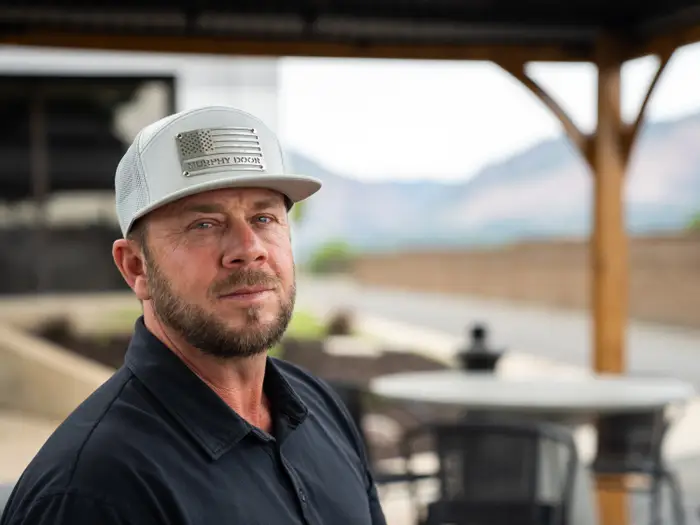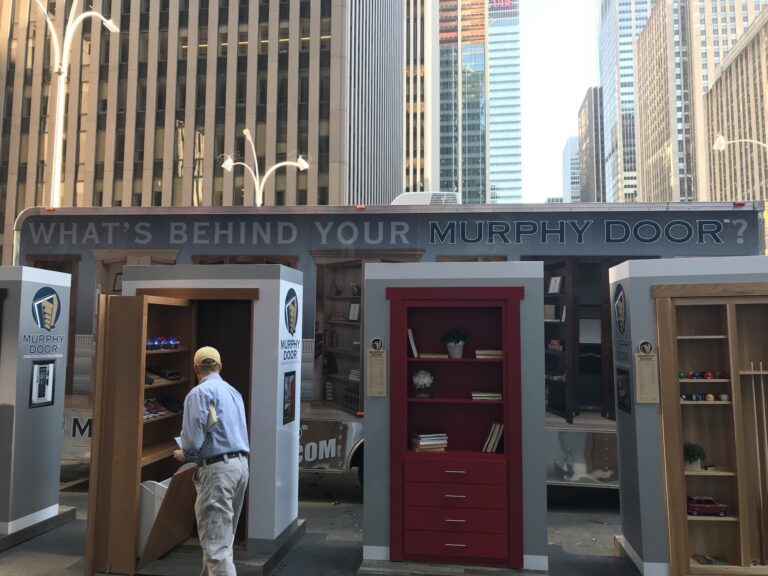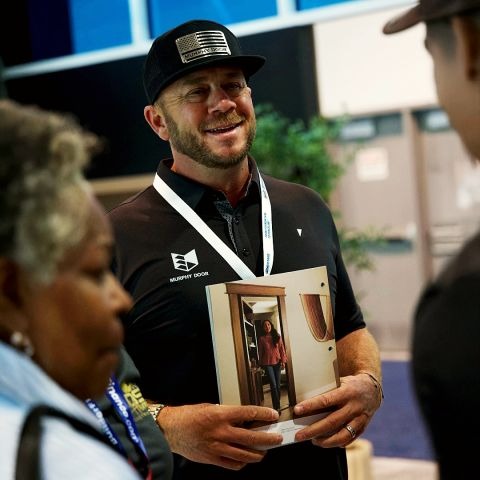About Jeremy Barker
Founder and CEO of Murphy Door
Jeremy Barker’s journey is rooted in hard‑won resilience. He earned his first fortune by 21, went bankrupt twice and even lived out of his car for a year. Determined to support his family without leaving the fire service he loved, he began crafting hinges for hidden doors after a home‑theater project for his children sparked the idea. There was nothing like it on the market, so he turned his side‑hustle into Murphy Door, a company that creates hidden doors disguised as bookshelves and cabinets,

Entrepreneurial Beginnings

Born with an entrepreneurial streak, Barker launched his first company at 18 supplying Home Depot with outdoor wooden storage sheds. Although he “made $20 million in a year” from that venture, early success was followed by catastrophic setbacks—he filed for bankruptcy twice before age 25 and at one point lived in his truck after losing his fortune. These experiences instilled the frugality and resourcefulness that underpin his later ventures. To support his family through the downturns, he pursued public service as a firefighter and paramedic, earning an associate’s degree in paramedicine at Weber State University. Barker continued to work in emergency services while rebuilding his entrepreneurial career, a dual role that recalibrated his perception of risk and taught him that business mistakes are not life‑or‑death.
Founding and Scaling Murphy Door
The idea for Murphy Door emerged in 2012 when Barker, still working as a firefighter, built a hidden door to conceal a home theater he was making for his children. Realizing that no product on the market delivered both secrecy and functionality, he turned the project into a company. Barker kept Murphy Door as a side hustle, reinvesting all profits, and the business earned just $30,000 in its first year. In 2013 he put the products online, and at the 2014 NAHB International Builders’ Show a passer‑by suggested that he pivot from panic‑room doors to storage‑focused hidden doors; the feedback led to a fundamental redesign. By 2015 Murphy Door products were on Home Depot’s website, and when annual revenue hit $5 million in 2016 he left firefighting to focus on the company full‑time

The business has since experienced explosive growth. Revenue climbed from $7 million in 2020 to nearly $28 million in 2024, with the company maintaining roughly 70 percent year‑over‑year growth. Murphy Door employs more than 100 people across facilities in Utah, Kentucky and Texas and has delivered over 200,000 installations worldwide. Its viral social‑media presence has generated more than one billion organic views and attracted celebrity clients and partnerships. Barker attributes the success to a combination of customer‑driven design (listening closely to feedback) and vertically integrated U.S.‑based manufacturing that allows rapid iteration and quality control. A philosophy he summarized in Authority Magazine as “Own the process — not just the idea”.
Built Upon Resilience
Jeremy Barker’s approach to leadership was shaped by years in emergency services, where quick thinking and calm under pressure were a matter of survival. Those experiences taught him that resilience is less about toughness and more about growth, about learning from every setback and using each challenge to become stronger.
In business, he encourages patience and discipline. Sustainable companies, he says, are built by founders who reinvest early profits and stay focused on solving real problems. He believes the best leaders test ideas quickly, listen closely to customers, and refine constantly. A founder should also be the most committed user of their own product; conviction has to start at the top.
Barker’s commitment to American manufacturing reflects this same philosophy. Producing locally keeps teams nimble, ensures quality, and connects leadership directly to the process. To him, leadership is about presence, adaptability, and the quiet confidence to guide others through uncertainty.
Personal Life
Jeremy Barker lives in Ogden, Utah with his wife Shannon and their four children. He credits his family’s support for helping him weather financial hardship and build multi‑million‑dollar enterprises. A former firefighter and paramedic, he remains committed to hiring employees with backgrounds in public service and to giving back to his community. In 2024 he was a finalist for Ernst & Young’s Entrepreneur of the Year award and in 2025 Fortune recognized Murphy Door as one of America’s most innovative companies—milestones that underscore how far he has come from sleeping in his truck to leading a company redefining home innovation.

Why?
Creating hidden-door solutions that transform wasted space into functional, secure and beautiful places.
Barker built Murphy Door on the belief that great products emerge from serving both people and purpose. He insists that happy employees make happy customers and works to remove friction from every step of the customer experience. Many of his team members are first responders like himself, and he reinvests profits to ensure growth benefits everyone. The company manufactures in the U.S. and has expanded with plants in Utah, Kentucky and Texas, staying true to his commitment to domestic materials and craftsmanship.
His path to success wasn’t linear. Early ventures included a construction and shed‑building business and a major partnership with a big‑box retailer. Along the way he learned the importance of discipline, financial transparency and reinvention. Today Murphy Door is recognized for patented hardware, rapid growth and collaborations with Hollywood productions, but Barker still serves as a firefighter and shares his lessons through his 90 Proof Wisdom podcast. For him, creating hidden doors is about empowering others to reclaim space and possibility in their lives—proof that even the toughest setbacks can unlock extraordinary potential.
More About Jeremy Barker
Sales Leadership: From the Engine to the Factory Floor

I learned leadership in a place where adrenaline is cheap and coordination is priceless. On the engine, speed comes from choreography: everyone knows the first move, the hazards, and the handoff before the rig stops rolling. That rhythm translates directly to how we build doors and how we sell them. We start every morning with an eight-minute stand-up.
Startups with Stu: How We Built a Category (and What We’re Building Next)

Lost $20M. Slept in a Truck. Built a Brand Anyway. (UtahPreneur)

I don’t hide the losses. I lost $20 million before 22. Went bankrupt. Lived in my truck for a year. Went back to the firehouse and started over. On UtahPreneur, we got past the hero narrative and into the operator math that actually travels. Dreams are cheap. Discipline compounds. Define the end state. Attack one constraint at a time—machine, skill, supplier, cash. If it doesn’t move lead time or first-pass yield, it’s noise.